Enlightened staging and direction mark TheatreLab’s ‘Tempest’
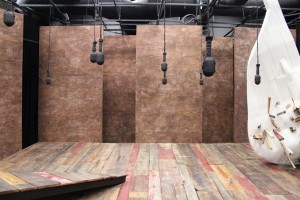 On stage now at FGCU TheatreLab is William Shakespeare’s The Tempest. The play is thought to be the last one that the Bard wrote alone.
On stage now at FGCU TheatreLab is William Shakespeare’s The Tempest. The play is thought to be the last one that the Bard wrote alone.
Director Barry Cavin’s staging of this show is startling, to say the least. There is basically no set, just a sculptural piece made of Styrofoam, rope, pine and oak that suggests the hull of an old ship. The 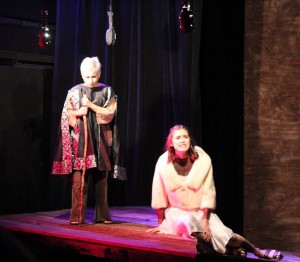 stage is constructed of mottled three-quarter inch wood planking salvaged from an old Kentucky barn, interrupted only by a ramp that ends in an elevated platform stage right. Actors appear and disappear through openings between staggered burl panels that form as backdrop for the audience. That’s it. That’s all Cavin and his set construction crew give us by way of scenery and set.
stage is constructed of mottled three-quarter inch wood planking salvaged from an old Kentucky barn, interrupted only by a ramp that ends in an elevated platform stage right. Actors appear and disappear through openings between staggered burl panels that form as backdrop for the audience. That’s it. That’s all Cavin and his set construction crew give us by way of scenery and set.
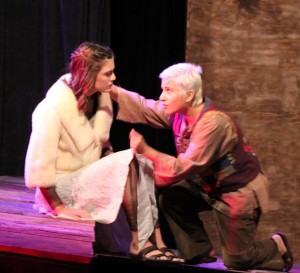 “This is late in Shakespeare’s body of work and my reading of The Tempest suggests that Shakespeare seems a bit weary of the need to entertain his audiences and he feels his magic getting worn around the edges,” states Cavin, a theater professor who has written more than forty fully-produced plays over the course of his career, more than a dozen of which have been performed at FGCU. “Thus the reason for the worn wood, rag-tag costumes and handmade props. Plus, I want to
“This is late in Shakespeare’s body of work and my reading of The Tempest suggests that Shakespeare seems a bit weary of the need to entertain his audiences and he feels his magic getting worn around the edges,” states Cavin, a theater professor who has written more than forty fully-produced plays over the course of his career, more than a dozen of which have been performed at FGCU. “Thus the reason for the worn wood, rag-tag costumes and handmade props. Plus, I want to 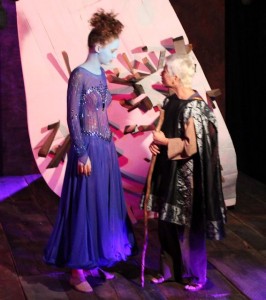 strip away the polish, the paint, the glitter and the dazzle and instead focus on the labor of the actors and the crew and on the simple beauty of the poetry and the ideas.”
strip away the polish, the paint, the glitter and the dazzle and instead focus on the labor of the actors and the crew and on the simple beauty of the poetry and the ideas.”
But his minimalist set does serve another function. It is the perfect foil for the network of black trouble lights that drop down from the rafters and metal grid high above the makeshift stage floor. As the actors come on stage to interact with each other and deliver their lines, they turn on the light overhead, and when they are done, they extinguish the light and exit the stage.
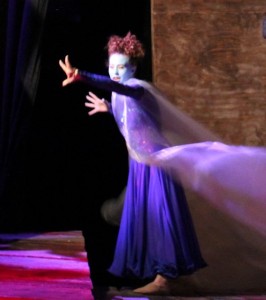 This device is not only effective for focusing the audience’s attention on the characters appearing before them and what they are saying, it gives them agency as they light their own path in the story. In addition, the lighting reinforces the overarching theme that Shakespeare seeks to express in The Tempest. “There are many themes offered in this play,” expounds Cavin, “but one theme in The Tempest is constant in many of Shakespeare’s works and that’s that we are all born to play our parts for each other in this dreamy world in which we are mere shadows and all grow weary of the
This device is not only effective for focusing the audience’s attention on the characters appearing before them and what they are saying, it gives them agency as they light their own path in the story. In addition, the lighting reinforces the overarching theme that Shakespeare seeks to express in The Tempest. “There are many themes offered in this play,” expounds Cavin, “but one theme in The Tempest is constant in many of Shakespeare’s works and that’s that we are all born to play our parts for each other in this dreamy world in which we are mere shadows and all grow weary of the 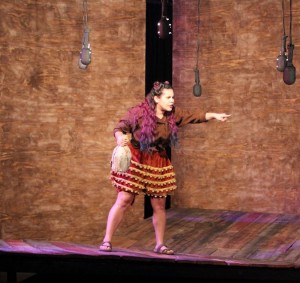 show.”
show.”
The play’s central character is a duchess by the name of Prospero. In a departure from the original, where all but one character were males, nine of the eleven students who’ve been cast in this show are females, including the duchess, who is played by Hanny Zuniga. If the name sounds familiar, it is because Zuniga has appeared in many productions at Ghostbird Theatre Group, which is currently producing a piece called “The Chicken Play” 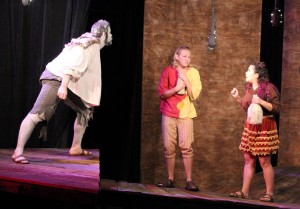 which she co-wrote with James Brock.
which she co-wrote with James Brock.
In the speeches given by Prospero, Cavin senses a feeling of weariness, as if Shakespeare had grown tired of the constant pressure to entertain his adoring fans. “I think every entertainer hits the wall at some point,” observes Cavin. Through his enlightened direction, Zuniga taps into this exhaustion in 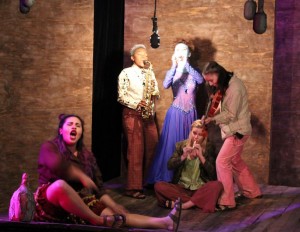 a way that’s palpable to the audience in spite of, or perhaps because of the language Shakespeare employs in the play.
a way that’s palpable to the audience in spite of, or perhaps because of the language Shakespeare employs in the play.
There are a few musical pieces contained in this production. Zuniga provides the vocals for two of them. She sings one is a’ cappella. The other provides the accompaniment of just an instrument or two. That’s for the better, as Zuniga needs no help. Her voice is strong, 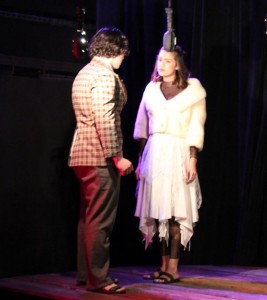 her range broad, and she’s a stand-out whether singing or acting in this production.
her range broad, and she’s a stand-out whether singing or acting in this production.
“The songs are in the play as written,” divulges Cavin. “I came up with a couple of the melodies, one was a joint effort with one of the actors, the drunken melody was created by the student singing it and the final one is from Twelfth Night. I changed all Ariel’s songs into the bit with the handmade chimes. But yes, lots of songs in this one.”
All eleven FGCU students turn in workmanlike performances. “They’ve all worked hard on the show and I hoped they learned a lot,” reports Cavin.
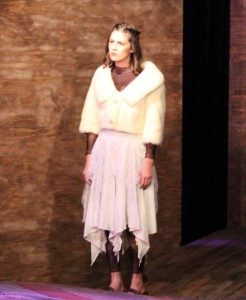 Lily Weaver is especially delightful as the ephemeral spirit Ariel, who must do Prospero’s bidding in order to win her freedom. Daniel Cancio, who has appeared of late at Lab Theater (in Josh Harmon’s Bad Jews as well as a staged reading of Robert Caisley’s The Open Hand), is brilliant as the tortured half-human monster Caliban, who improvidently pledges his allegiance to the Dionysian drunkard Stephano, played to the hilt by effervescent Brittany Rincon. She and fellow fool Trinculo, played by Sam Silverberg, elicit belly laughs from audience throughout the two hour production in the finest tradition of the drunken jesters Shakespeare likes to include for
Lily Weaver is especially delightful as the ephemeral spirit Ariel, who must do Prospero’s bidding in order to win her freedom. Daniel Cancio, who has appeared of late at Lab Theater (in Josh Harmon’s Bad Jews as well as a staged reading of Robert Caisley’s The Open Hand), is brilliant as the tortured half-human monster Caliban, who improvidently pledges his allegiance to the Dionysian drunkard Stephano, played to the hilt by effervescent Brittany Rincon. She and fellow fool Trinculo, played by Sam Silverberg, elicit belly laughs from audience throughout the two hour production in the finest tradition of the drunken jesters Shakespeare likes to include for 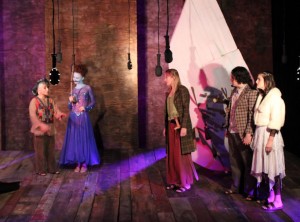 comedic relief. Lauren Tindle makes the most of her limited appearances as Prospero’s dutiful but besotted daughter, Miranda. But, of course, it is Zuniga as Prospero who shines throughout the show.
comedic relief. Lauren Tindle makes the most of her limited appearances as Prospero’s dutiful but besotted daughter, Miranda. But, of course, it is Zuniga as Prospero who shines throughout the show.
All theater devotees should treat themselves to Shakespeare whenever and wherever offered, but TheatreLab’s production deserves particular 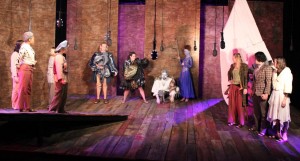 consideration for the reasons expressed above. This is a novel, somewhat unconventional presentation, yet it pays homage to the Bard and the wonderful prose and poetry he incorporates into this play.
consideration for the reasons expressed above. This is a novel, somewhat unconventional presentation, yet it pays homage to the Bard and the wonderful prose and poetry he incorporates into this play.
See below for play date, times and ticket 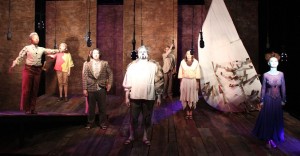 information. Seating is very limited, so buy your tickets in advance. They are available at fgcu.edu/cas/bsma and cost $10 for the general public and $7 for students with proper ID.
information. Seating is very limited, so buy your tickets in advance. They are available at fgcu.edu/cas/bsma and cost $10 for the general public and $7 for students with proper ID.
November 11, 2016.













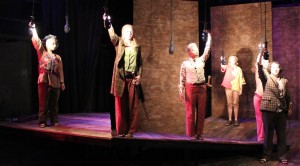

 Tom Hall is both an amateur artist and aspiring novelist who writes art quest thrillers. He is in the final stages of completing his debut novel titled "Art Detective," a story that fictionalizes the discovery of the fabled billion-dollar Impressionist collection of Parisian art dealer Josse Bernheim-Jeune, thought by many to have perished during World War II when the collection's hiding place, Castle de Rastignac in southern France, was destroyed by the Wehrmacht in reprisal for attacks made by members of the Resistance operating in the area. A former tax attorney, Tom holds a bachelor's degree as well as both a juris doctorate and masters of laws in taxation from the University of Florida. Tom lives in Estero, Florida with his fiancee, Connie, and their four cats.
Tom Hall is both an amateur artist and aspiring novelist who writes art quest thrillers. He is in the final stages of completing his debut novel titled "Art Detective," a story that fictionalizes the discovery of the fabled billion-dollar Impressionist collection of Parisian art dealer Josse Bernheim-Jeune, thought by many to have perished during World War II when the collection's hiding place, Castle de Rastignac in southern France, was destroyed by the Wehrmacht in reprisal for attacks made by members of the Resistance operating in the area. A former tax attorney, Tom holds a bachelor's degree as well as both a juris doctorate and masters of laws in taxation from the University of Florida. Tom lives in Estero, Florida with his fiancee, Connie, and their four cats.